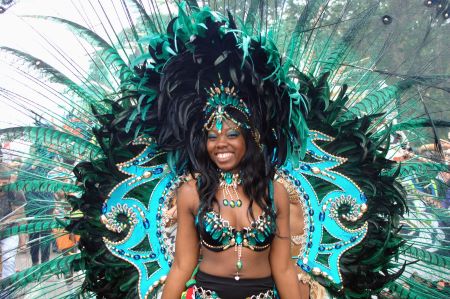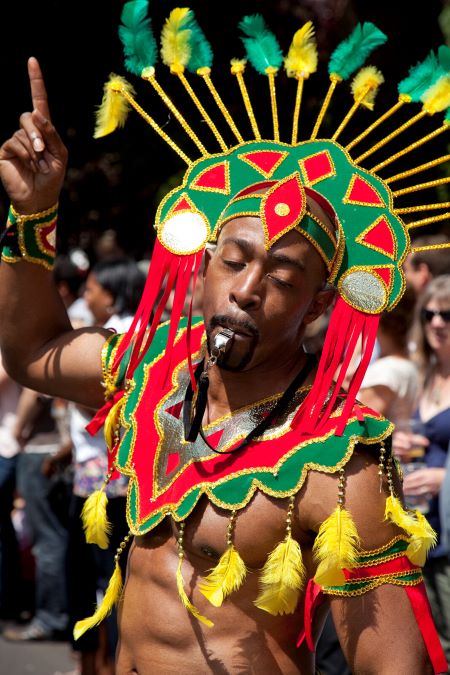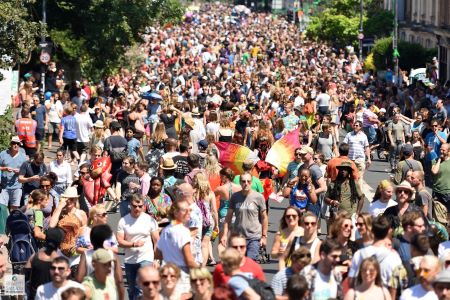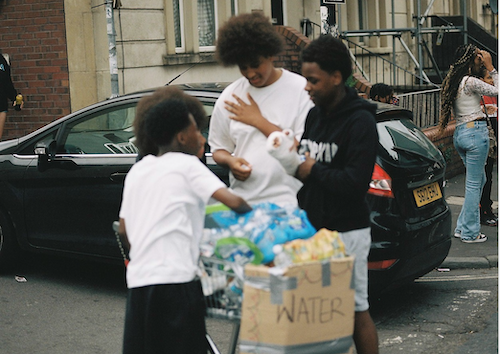ST PAUL’S Carnival, Bristol’s celebration of African Caribbean culture, was scaled back this year due to funding issues – but unauthorised street parties proved the spirit of the carnival was as strong as ever.
July 5th’s celebrations brought a reminder of the event’s grassroots origins.
In the absence of a full carnival local residents launched unauthorised street parties which later resulted in police and the council having to close the roads.
 Young locals serve refreshments from an impromptu stall during this year’s unofficial St Paul’s Carnival street celebrations, a testament to local creativity and resilience in keeping the event’s traditions alive (Pic: Samuel Gurden)
Young locals serve refreshments from an impromptu stall during this year’s unofficial St Paul’s Carnival street celebrations, a testament to local creativity and resilience in keeping the event’s traditions alive (Pic: Samuel Gurden)
Among those who witnessed events was Samuel Gurden, 25. He went to capture photos at the carnival in the afternoon after he finished his shift in a Bristol café.
“There was definitely a really good sense of community that I think Bristol always has and always will keep” he said.
However he said that when he returned to the street parties later that evening after going home to get more film, the atmosphere had shifted.
“It went from, like, kids in the street, everyone having a little dance, to people going somewhere with beers in their hand to the police presence being a bit more. There was this sense in the air that it wasn’t, necessarily, about celebrating stuff.”
 A reveller in vibrant costume during a recent St Paul’s Carnival. This year’s event was scaled back due to funding pressures (Pic: Purplefish)
A reveller in vibrant costume during a recent St Paul’s Carnival. This year’s event was scaled back due to funding pressures (Pic: Purplefish)
Organisers warn that without adequate funding and support, St Paul’s carnival could disappear.
After 2023’s full-scale carnival – the first following a three year COVID-induced break – cost around twice the budget, the team behind the event knew they would have to secure more money or make changes.
Ricardo Sharry, Director of St. Paul’s Carnival for just over 18 months, spoke to The Voice about the challenges they have faced.
He explained that retaining the cultural and community focused spirit of the event was central to his work as director.
“Just say we disappear tomorrow, as the carnival, the community will still rally around the street parties” he said. “But there won’t be any parades, there won’t be any elders brunch, so, it will still feel disconnected.
“So, there will be some people who will be really happy because they’ve got the carnival in name, but all of the cultural elements will all just disappear.”
 Costumes like this were a central part of 2023’s St Paul’s Carnival which returned at full scale for the first time after the pandemic (Pic: Purplefish)
Costumes like this were a central part of 2023’s St Paul’s Carnival which returned at full scale for the first time after the pandemic (Pic: Purplefish)
These key cultural elements were incorporated into this year’s carnival, including the Elder’s Brunch, Education Programme, and Youth Programme.
The Elder’s Brunch was held at Circomedia, where over 80 elders shared stories around the early days of St. Paul’s carnival, celebrating their contributions to the community.
As part of the education programme, nine schools from the immediate catchment area performed, showcasing costumes and culture in a scaled down parade.
These related to this year’s theme, Roots of Resistance, commemorating the 60th anniversary of the Race Relations Act.
The Race Relations Act of 1965 was the UK’s first legislation to ban specific forms of racial discrimination and was influenced in part by the 1963 Bristol Bus Boycott.
Given Bristol’s significant role in the UK’s Black history, the Bristol event remains an important symbol of both remembrance and celebration for the local African Caribbean community.
Beyond this, Sharry explained that the carnival has decades of cultural capital that transcend the multiple different communities from the diaspora who reside in the area.
 Carnival crowds: Revellers pack the streets of St Paul’s during a recent carnival, reflecting the energy, pride and community spirit that defines the event (Pic: Purplefish)
Carnival crowds: Revellers pack the streets of St Paul’s during a recent carnival, reflecting the energy, pride and community spirit that defines the event (Pic: Purplefish)
“It has had an influence on music, the city, and law, he said. “It’s basically had such an impact, it’s shaped some of the values of the Black community in the country.
“The whole point of it is that it both celebrates Black culture, but it actually, fundamentally, is like our asset. No-one can take it away from us. Like, it belongs to us and is for us, so that’s why it’s so important.”
However he acknowledged that ensuring the carnival can continue supporting the local community and celebrating Black history and culture, as well as keeping the party going, is a difficult balancing act.
“Essentially we’ve got this ongoing battle at the moment in Bristol. It’s that half of the people really like the parties and then the other half of the people are, like, where’s all the cultural stuff?”
Sharry added that funding from the city council and support from the community was essential in bridging this divide.
“Carnival is a whole year operation” he said. “The fundraising around it is both grassroots and city-led. If people are unhappy about it now, now is the time to start thinking about how we capacity-build it. Not next year, two weeks before carnival.”
